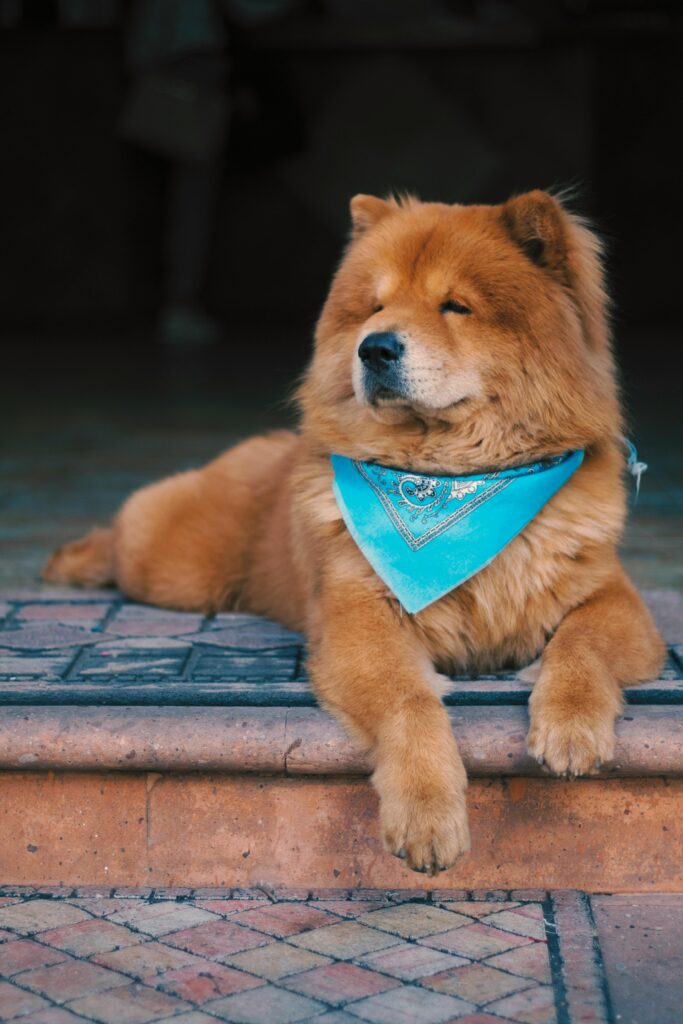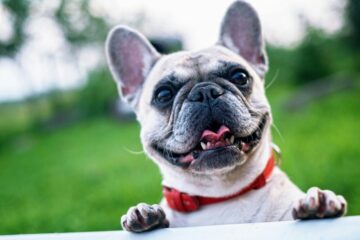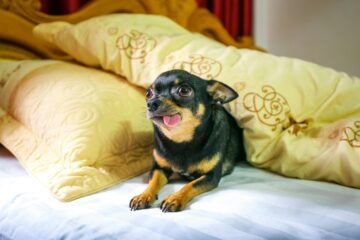
Introduction to the Chow Chow
The Chow Chow, an ancient dog breed, traces its origins back to northern China, making it one of the oldest breeds known to mankind. Historical records suggest that this breed has been around for over 2,000 years, often serving as companions to Chinese nobility. Their presence in ancient Chinese art, pottery, and sculptures highlights their significance and esteemed status throughout history.
One of the most distinctive features of the Chow Chow is its lion-like mane, which gives the breed a regal and imposing appearance. This dense, plush fur not only adds to its majestic look but also provides insulation against harsh weather conditions. Another notable characteristic is the Chow Chow’s unique blue-black tongue, a trait that sets it apart from almost all other dog breeds.
Physically, the Chow Chow is a robust and sturdy dog with a broad skull, small, triangular ears, and deep-set eyes that exude a sense of aloofness. This breed’s compact and muscular build, combined with its distinctive gait, underscores its strength and agility, despite its seemingly cumbersome appearance.
In terms of temperament, the Chow Chow is known for its independent and reserved nature. While they are incredibly loyal to their family, they can be wary of strangers, often displaying a protective streak. This breed’s aloof demeanor can sometimes be mistaken for indifference, but those familiar with Chow Chows understand that their affection is profound and reserved for those they trust deeply. Furthermore, their intelligence and strong-willed nature require consistent training and socialization from an early age to ensure they grow into well-rounded companions.
From their ancient roots to their modern-day appeal, the Chow Chow continues to captivate dog enthusiasts worldwide with its unique blend of physical traits and distinctive personality.
Chow Chow Temperament and Personality
The Chow Chow is renowned for its distinctive temperament and personality traits, which set it apart from other dog breeds. One of the most noteworthy characteristics of the Chow Chow is its aloofness. Unlike more overtly affectionate breeds, Chow Chows tend to be more reserved with their emotions, often appearing indifferent to strangers. This aloofness is coupled with a strong sense of independence, making them less reliant on constant human interaction compared to other dogs.
Despite their independent nature, Chow Chows are incredibly loyal to their family members. They form strong bonds with their owners and can be quite protective. This loyalty, however, comes with a degree of territorial behavior, which can manifest as wariness or even aggression toward unfamiliar people or animals. Therefore, it is crucial to introduce a Chow Chow to various situations, people, and pets early in their life to ensure they grow up to be well-rounded and sociable adults.
When it comes to interactions with family members, Chow Chows are typically calm and dignified. They are not overly playful but enjoy spending time with their loved ones in a more subdued manner. With strangers, they are often standoffish and can take time to warm up, if they do at all. Their interaction with other pets can be unpredictable; some Chow Chows coexist peacefully with other animals, while others may exhibit dominant or territorial behavior.
Early socialization and consistent training are paramount in managing the Chow Chow’s sometimes stubborn and territorial nature. These dogs respond best to positive reinforcement techniques and require a firm yet gentle approach to training. Given their independent streak, it’s essential to establish clear boundaries and expectations from a young age. Proper training and socialization can help mitigate potential behavioral issues, making the Chow Chow a well-mannered and enjoyable companion.
Are Chow Chows Good Pets?
The Chow Chow is a distinctive and ancient dog breed that has captured the hearts of many pet enthusiasts. However, whether they make good pets can depend on various factors, such as the living environment, family structure, and lifestyle of potential owners.
When it comes to the living environment, Chow Chows can adapt to both apartment living and houses with yards. Their moderate activity level means they do not require large spaces to roam, but they do benefit from regular walks and outdoor playtime. Owners living in apartments should ensure their Chow Chow gets sufficient exercise to avoid boredom and potential behavioral issues.
Regarding family structure, Chow Chows can be suitable for families with children, though their somewhat aloof nature means they may not always be the most playful companions. It is crucial to supervise interactions between young children and Chow Chows to ensure mutual respect and safety. For elderly individuals, Chow Chows can be excellent pets due to their calm demeanor. However, it is essential to consider the grooming needs and potential mobility issues when caring for a dog of this breed.
The lifestyle of the owner is another critical consideration. Chow Chows are known for their independent and sometimes stubborn nature, which can be a challenge for first-time dog owners or those with a very active lifestyle. They thrive in a more relaxed, sedentary environment where they can enjoy leisurely walks rather than vigorous exercise. Their protective nature makes them excellent watchdogs, but this can also lead to territorial behavior if not properly managed.
In summary, owning a Chow Chow comes with both advantages and challenges. Their loyal and protective nature, combined with their adaptability to different living environments, makes them suitable for various types of owners. However, their grooming needs, potential for stubbornness, and requirement for proper socialization must be taken into account to ensure a harmonious relationship with this unique breed.
The Chow Chow, an ancient dog breed known for its distinctive appearance and independent nature, is also prone to a variety of health issues. Among the most common genetic predispositions are hip dysplasia, entropion, and thyroid disorders. Hip dysplasia, a malformation of the hip joint, can lead to arthritis and mobility challenges. Chow Chows with hip dysplasia may show signs such as limping, reluctance to move, or difficulty standing up after resting.
Entropion, a condition where the eyelids roll inward, causing the eyelashes to irritate the cornea, is another prevalent issue in Chow Chows. This can lead to chronic eye discomfort and even damage to the eye if left untreated. Owners should be vigilant for symptoms like excessive tearing, squinting, or pawing at the eyes. Early detection and surgical correction can help prevent long-term complications.
Thyroid problems, particularly hypothyroidism, are also common in this breed. Hypothyroidism occurs when the thyroid gland produces insufficient hormones, leading to symptoms such as lethargy, weight gain, and skin problems. Regular blood tests can help in early diagnosis and effective management through medication.
To ensure the well-being of a Chow Chow, regular veterinary check-ups are essential. These visits allow for early detection and management of health issues, thereby improving the dog’s quality of life. Additionally, maintaining a healthy diet, incorporating regular exercise, and providing adequate grooming can contribute significantly to their overall health.
The average lifespan of a Chow Chow ranges from 8 to 12 years. By prioritizing health monitoring and preventive care, owners can help their Chow Chows lead healthier and happier lives. Recognizing the breed’s specific health challenges and addressing them promptly is key to managing their well-being effectively.
Diet and Nutrition for a Healthy Chow Chow
Maintaining a balanced diet is crucial for the overall health and well-being of a Chow Chow. Given their unique physiology, it’s essential to tailor their nutrition to meet their specific needs. A well-rounded diet ensures not only their physical health but also supports their distinctive coat and skin condition, which are hallmarks of this ancient breed.
A balanced diet for a Chow Chow should include high-quality protein sources, such as chicken, beef, or fish, which aid in muscle development and maintenance. Carbohydrates, sourced from brown rice or sweet potatoes, provide the necessary energy levels for their daily activities. Additionally, healthy fats from fish oil or flaxseed are vital for maintaining their luxurious coats and promoting skin health.
Portion control is another critical aspect of a Chow Chow’s diet. This breed is prone to obesity, which can exacerbate joint issues and other health problems. Feeding them the right amount of food based on their age, weight, and activity level helps prevent overfeeding. Dividing meals into two or three smaller portions throughout the day can also aid in digestion and prevent bloating.
It’s prudent to avoid common allergens that can trigger adverse reactions in Chow Chows. Ingredients such as soy, wheat, and corn are known allergens and should be excluded from their diet. Instead, opting for hypoallergenic dog food formulations can minimize the risk of skin irritations and digestive issues.
Incorporating supplements into their diet can provide additional support for joint, skin, and coat health. Glucosamine and chondroitin are beneficial for joint health, while omega-3 fatty acids contribute to a healthy coat and skin. Always consult with a veterinarian before adding any supplements to ensure they are appropriate for your specific Chow Chow.
Proper hydration is equally important. Fresh, clean water should be available at all times to prevent dehydration, which can lead to serious health complications. Monitoring their water intake and ensuring they drink enough, especially during warmer months, is essential.
Managing food-related issues, such as food allergies or sensitivities, requires close observation and possibly an elimination diet to identify and remove problematic ingredients. Regular veterinary check-ups can help in monitoring their overall health and adjusting their diet as needed.
Grooming and Care Needs
The Chow Chow, renowned for its distinct appearance and dignified demeanor, requires meticulous grooming to maintain its dense double coat. This breed’s grooming needs are comprehensive, necessitating specific tools and techniques to ensure their coat remains healthy and free of mats. A thorough grooming routine is essential not only for aesthetic purposes but also for the overall well-being of the Chow Chow.
One of the primary grooming tasks is regular brushing. Given the thickness of the Chow Chow’s coat, it is recommended to brush them at least three to four times a week. Utilizing a combination of a slicker brush and a metal comb can effectively manage their fur. The slicker brush helps remove loose hair and prevent tangles, while the metal comb can reach through the dense undercoat to eliminate mats. During seasonal shedding, usually in the spring and fall, daily brushing is advisable to manage the increased hair loss and prevent the formation of mats.
Bathing is another critical aspect of grooming. Regular baths, approximately once a month, help keep the Chow Chow’s coat clean and free of dirt and debris. It is essential to use a high-quality dog shampoo and ensure thorough rinsing to avoid any residue that could irritate their skin. Additionally, after each bath, it is crucial to dry the coat completely to prevent dampness that could lead to skin issues.
Beyond the coat, proper ear cleaning is vital for Chow Chows. Their ears should be checked weekly for signs of infection or wax buildup. Using a vet-recommended ear cleaner, gently wipe the outer ear to maintain cleanliness. Dental care is equally important; regular brushing of the teeth, at least two to three times a week, can help prevent dental diseases and maintain oral hygiene.
Breed-specific challenges such as the potential for overheating due to their thick coat must be addressed. During warmer months, it is advisable to keep the Chow Chow in a cool environment and provide plenty of water. Regular grooming and care not only enhance the Chow Chow’s appearance but also contribute significantly to their overall health and comfort.
Training and Socialization Tips
Training and socializing a Chow Chow requires a nuanced approach, leveraging their unique characteristics. Given their independent and somewhat aloof nature, it is essential to employ consistent, positive reinforcement methods. This breeds loyalty and trust, fostering a conducive environment for effective training. Reward-based techniques, such as treats and praise, can significantly enhance their responsiveness during training sessions.
House training a Chow Chow should commence as early as possible. Establish a routine that aligns with their natural schedule, taking them outside frequently and rewarding them when they eliminate outside. Consistency is vital; any deviation can lead to confusion and setbacks. Patience and persistence are key, as Chow Chows may take longer to house train compared to other breeds.
Obedience training should focus on basic commands such as sit, stay, and come. Short, engaging sessions are more effective than prolonged ones, given the Chow Chow’s independent streak. It is also important to assert yourself as the leader without using harsh or punitive measures, which can lead to resistance and behavioral issues. Instead, maintain a calm and assertive demeanor, reinforcing commands with positive reinforcement.
Behavioral issues such as stubbornness or aggression can surface if a Chow Chow is not properly trained and socialized. Early socialization is paramount to ensure a well-rounded temperament. Exposing your Chow Chow to various environments, people, and other animals from a young age can mitigate potential behavioral problems. Supervised playdates and regular visits to parks can help them build confidence and adaptability.
In conclusion, training and socializing a Chow Chow necessitates a blend of patience, consistency, and positive reinforcement. By understanding their unique characteristics and tailoring your approach accordingly, you can cultivate a well-behaved and balanced companion. Early socialization further enriches their temperament, making them a delightful addition to any household.
Exercise and Activity Requirements
The Chow Chow, an ancient dog breed known for its distinctive appearance and dignified demeanor, has specific exercise needs that are crucial for maintaining both their physical and mental health. Despite their moderate energy levels, it is essential to provide them with regular physical activities to ensure their well-being. Daily walks are fundamental for Chow Chows, as they help to manage their weight and keep their muscles toned. A brisk 30-minute walk twice a day is generally sufficient, but this can be adjusted based on the individual dog’s age and health status.
In addition to walks, playtime is equally important for Chow Chows. Engaging in interactive games such as fetch or tug-of-war can be very beneficial. These activities not only provide physical exercise but also strengthen the bond between the dog and the owner. Given the Chow Chow’s thick double coat, it is prudent to consider the climate when planning outdoor activities. During hotter months, it’s advisable to exercise them in the cooler parts of the day, such as early morning or late evening, to prevent overheating. Conversely, in colder climates, their thick coat offers some protection, but it is still important to monitor them for signs of discomfort.
Mental stimulation is another critical aspect of a Chow Chow’s exercise regimen. These dogs are intelligent and can become bored easily if not provided with adequate mental challenges. Puzzle toys, obedience training, and interactive games can help keep their minds active and engaged. Regular training sessions also reinforce good behavior and strengthen communication between the dog and the owner.
Preventing obesity in Chow Chows is paramount, as excess weight can lead to various health issues such as joint problems and heart disease. Monitoring their diet, providing appropriate portion sizes, and ensuring regular exercise will help maintain a healthy weight. If in doubt, consulting with a veterinarian can provide tailored advice to meet the specific needs of your Chow Chow.



0 Comments